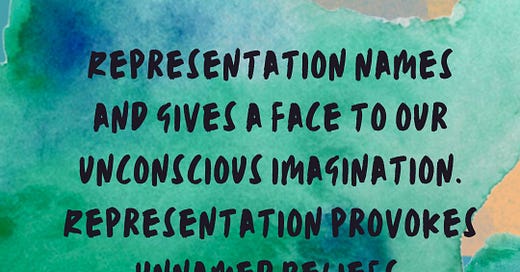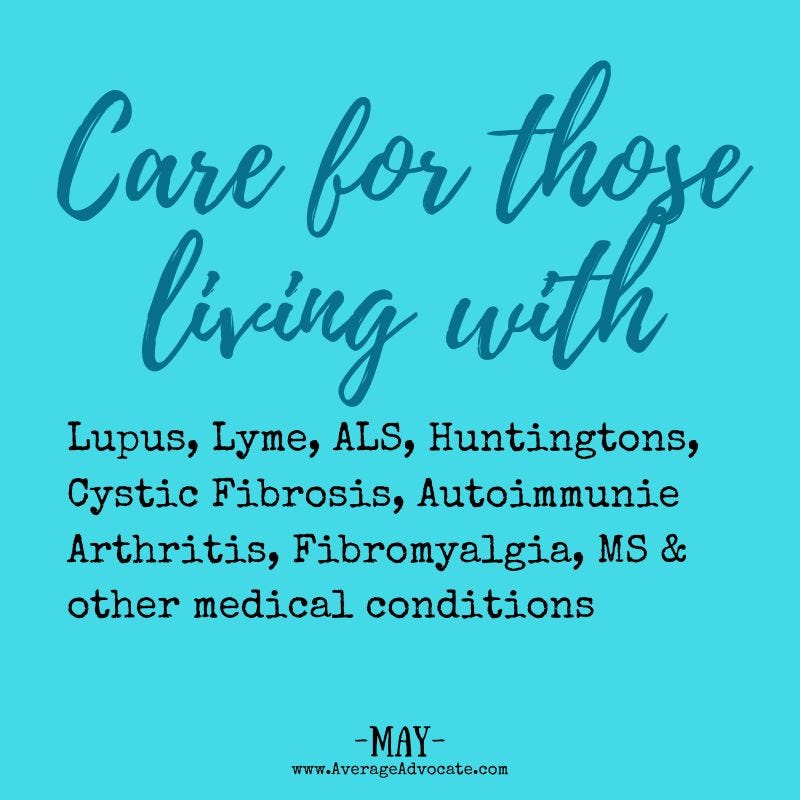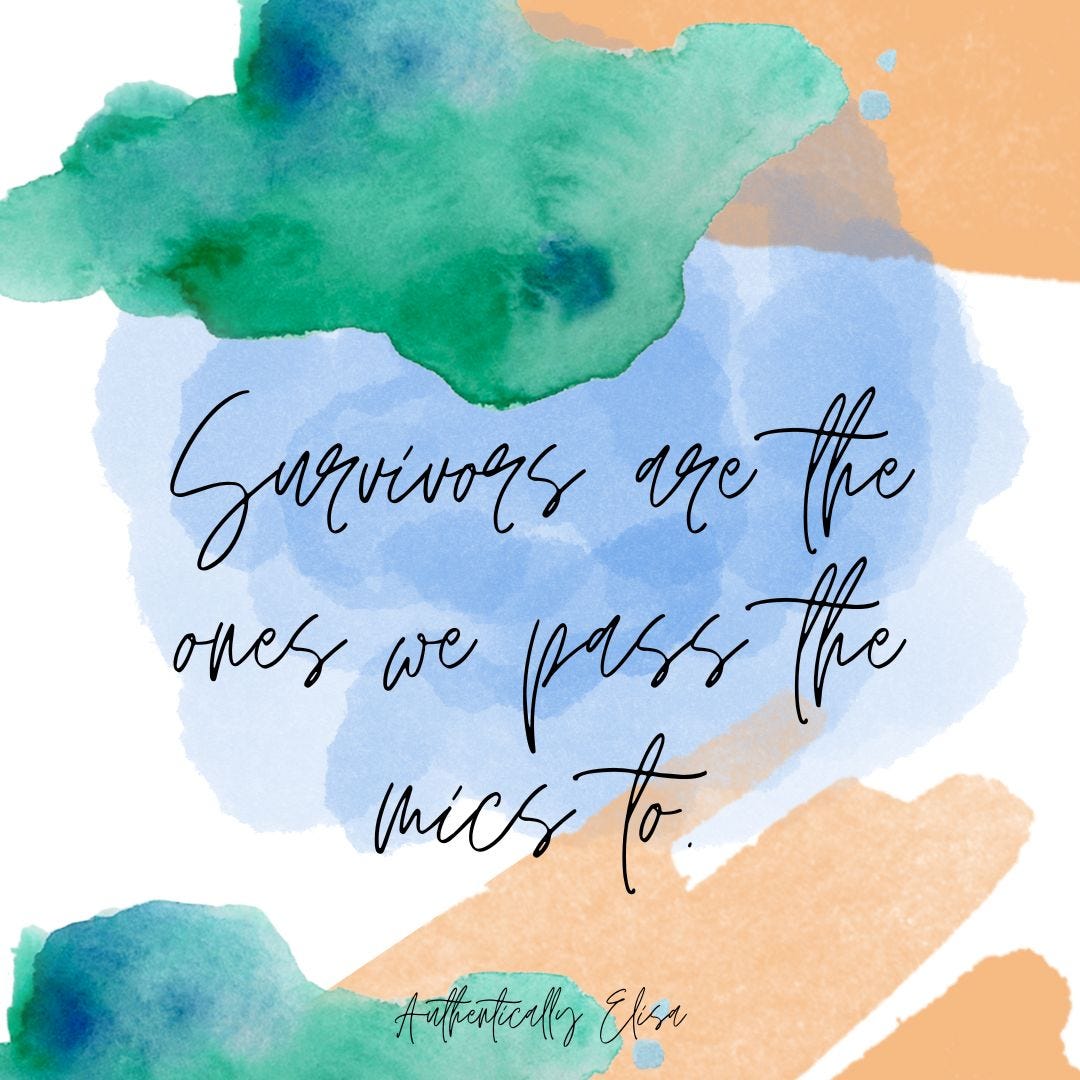Waves, Breakers, and Red Helicopters
On World Lupus Day, representation, survivor stories, and not feeling so alone
Reading the stories of other near-miss maternal survivors struggling with the feelings Mother's Day was provoking. Then right after that was World Lupus Day, and all of the stories that came with that—stories that had elements similar to mine. It is strange to find myself among others.
Representation
One profile showcased images of a woman sitting in a hospital bed. It caught me off guard. Then it surprised me that it startled me. Did I actually think I was the only person who had been frequently hospitalized from lupus-related problems? I hadn't seen anyone else in the hospital with lupus! At least, not that I was aware of—it's not like there are signs above our bed naming our conditions.
How would I know others were in the hospital because of lupus unless I saw an example? How would I know I wasn't the only one?
That's the thing about representation. Representation names and gives a face to our unconscious imagination and provocation to unnamed beliefs.
There is power in days like "World Lupus Day," "Autoimmune Arthritis Day," or "Huntington"s Day." Yes, there is the advocacy. But there is something else I'm discovering. These days help become part of a community. Through them, our stories expand.
The ocean’s breakers
May tenth was the first World Lupus Day I was able to participate in. It was nice. It was something I didn’t have to learn. I know how to participate in an awareness day.
On the other hand, I haven’t known how to advocate for my own health and survival. Lupus forced that upon me. I didn’t want that skill. It goes against everything people-pleasing in me. First, there is so much information to find, then sift through, then learn. What should I do with it? Do I know how to do that? What do I fight for? What should I wait for? How do I surrender and accept what I must? There are so many decisions. And then I have to ask—from my family, community, and medical teams. Self-advocacy is challenging and exhausting.
Advocating for your health is like trying to get past the breakers. You’re smothered by waves, one after the next. They come too close together to give you the time to brush your seaweed-tangled hair out of your face, or open eyes, lashes still dripping with spray. The sand rubbed your legs raw when you fell and the salt stings. Then another wave crashes you down.
Meanwhile, you’re supposed to direct a team of lifeguards. Once they realize you’re drowning, you have to help them to collaborate and rescue you.
Hello, lupus.
I know it isn’t just lupus that feels like this, I don’t want to discount other illnesses. Especially those tricky ones, like other autoimmune diseases, or just the process of getting diagnosed and care for anything feels similar. Whatever it is, self-advocacy for our own health can be very difficult; it can feel impossible to not drown. Let me give you hope, it does get calmer on the other side of those waves.
Red helicopter
Self-advocacy is much more personal and a very different type of advocacy than being an advocate for the problem on a wide-level. As activism is a familiar space to me, taking part in World Lupus Day on a wide-level felt good. It felt a little less about me and more about others.
Instead of crossing the breakers, I am in a bright red lifeguard helicopter. I am looking down on what’s happening and get to use my nifty hand-held radio to point out the people drowning—Roger that—and begin directing rescue efforts. I am far away and still quite effective.
Lived-expert
With lupus I find myself in a less familiar space. I can create awareness and advocate for others struggling. But I also know lupus intimately. I understand the needs of people with lupus because I have it. I am both in the breakers, getting knocked down, and I’m able to be an empathetic lifeguard at the same time. I mean, I can only help people not drown when I’m not drowning. But at the very least, I can still communicate on behalf of us drowning to the healthy lifeguards.
In the activism world, I'd be considered a survivor, a lived-expert on a lupus. Survivors are the ones we pass the mics to.
Stories from a lupus life
I was grateful for the other survivor voices I read this month. They had the power to help me not feel so alone as I read their stories. These lupus warriors gave me names for experiences that I couldn’t put my finger on before.
I found myself reflecting on how lupus still affects me now, a year and a half since I was first diagnosed. Although I am on remission’s path and not usually actively flaring—I am so grateful to God—my life has still changed, not just in how I was formed through that season, but in how I live today.
If you want a glimpse of one survivor's voice, I want to give you a chance. But this post is long enough already, I’ll send this another day this week.
In the meantime, keep standing up to the waves. It is worth it to make it past the breakers. And if you’re a lifeguard on the waters or in a red helicopter, thank you.
Read the rest of this series:
Please Don't Simplify the Complexities (Mini-Essay #1)
Pharmacy (Mini-Essay #2)
PTSD Et Al. (Mini-Essay #3)
Not-So-Friendly Insomnia (Mini-Essay #4)
Phantom Pain (Mini-Essay #5)
Hello, Hair! (Mini-Essay #6)
Homebody (Mini-Essay #7)
The Scars (Mini-Essay #8)
Betrayal (Mini-Essay #9)
Grief for a Lost Year (Mini-Essay #10)
Follow me on Instagram here @AuthenticallyElisa.
On Average Advocate this week:
Follow me on Instagram here @AuthenticallyElisa.
Read the next post in the series or the other posts related to this from the Lupus, Pregnancy, and Autoimmune Illness series at AverageAdvocate.com.






